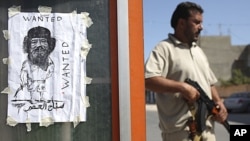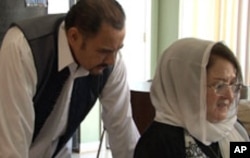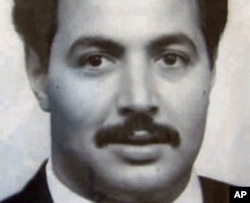Ashraf Tulty says he hasn’t been sleeping much lately. How can he, when events in his home country of Libya seem to change minute by minute?
Tulty, a 48-year-old Bengazhi native whose family moved to Tripoli when he was a baby, came to the United States 10 years ago and was granted asylum.
He and his family have been glued to their television while also trying to stay in touch with family members in Libya. Whether it’s by facebook and other social media - or by phone, Tulty and the others in his community have been anxiously watching the developments in Libya.
|
The Libyan Rebellion
|
Tulty said that he knows Moammar Gadhafi’s reign is over, but he is not sure what a new Libya will look like. He is not sure that the current head of the Transitional National Council - Mustafa Abdul Jalil - will lead be the man to lead a new Libya. But Tulty says his country will be very different from the last 42 years under Gadhafi.
“So maybe the president will be just a symbol like in various countries,” said Tulty. “And maybe we need a maverick, shrewd Prime Minister and government cabinets to rule Libya because the new stage of Libya is very challenging.”
Tulty said that he is not sure that the current head of the Transitional National Council - Mustafa Abdul Jalil - will lead be the man to lead a new Libya.
“We need the right people on board,” he said. “We need the people who have the qualification, who have the knowledge, who have the charisma to run Libya to the [next] stage.”
Tulty has paid a personal price for opposing Gadhafi - his brother was killed in Triploi’s notorious Abu Salim prison. Tulty and his family fled the country in 2011. This year, his cousin was killed in fighting in Benghazi.
Ashraf Tulty is active in the Libyan Council for North America, and is the chairman of its media committee. He works as a community relations manager for Guidance Residential, a financial services company which caters to the Islamic community.
As news came that opposition forces had capture Tripoli, family friends Aisha Swessi and her fiancée Mohaned al Zuni have came to watch the situation unfold on television. Al Zuni, a 27-year-old, came to the United States last year. He said it was hard to watch events in Libya unfold from far away.
“So that’s why I was happy and sad at the same time. I was so sad that I was not participating in the real protesting in Benghazi,” he said. “But thank God that everything is done now, and I hope that Libya will be better soon.”
Al Zuni says he wants to be a part of the new Libya, along with Aisha. She says Moammar Gadhafi took away what it meant to be Libyan - people’s identities - and she hopes that a new government will restore the country’s ideals. She said her grandparents used to travel freely in Libya and around the world, but after Gadhafi took power in 1969, her grandfather died in poverty.
She is finishing her degree in business management at George Mason University. Both hope to help rebuild Libya once the complicated game of who will lead the new Libya is decided. Al Zuni says he wants their children to grow up in a free Libya, with the same rights he has enjoyed since he moved to the United States in March of 2010.







